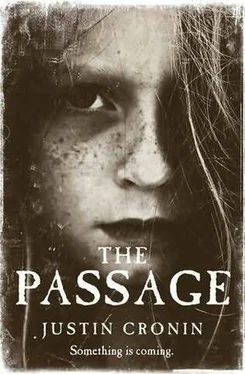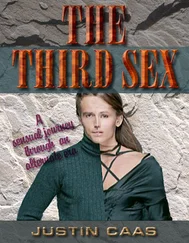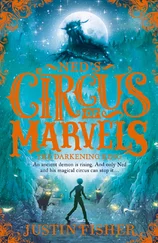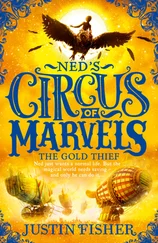He sunk his axe into a log and returned to the house and called up the stairs. “Amy!”
She appeared on the top step. Her skin saw so little sunlight that it was a rich, porcelain white.
“Have you ever seen snow?”
“I don’t know. I think so?”
“Well, it’s snowing now.” He laughed, and heard the pleasure in his voice. “You don’t want to miss it. Come on.”
By the time he got her dressed-in her coat and boots but also the glasses and cap, and a thick layer of sunscreen over every exposed inch of her skin-the snow had begun to fall in earnest. She stepped out into the whirling whiteness, her movements solemn, like an explorer setting foot on some new planet.
“What do you think?”
She tipped her face and stuck out her tongue, an instinctive gesture, to catch and taste the snow.
“I like it,” she declared.
They had shelter, food, heat. He’d made two more trips down to Milton ’s in the autumn, knowing that once winter came the road would be impassable, and had taken all the food that was left there. Rationing the canned goods, the powdered milk, the rice and dried beans, Wolgast believed he could make their stores last until spring. The lake was full of fish, and in one of the cabins he’d found an auger. A simple enough matter, then, to set up fishing lines. The propane tank was still half full. So, the winter. He welcomed it, felt his mind relax into its rhythm. No one had come after all; the world had forgotten them. They would be sealed away together, in safety.
By morning a foot of snow had piled around the cabin. The sun burst through the clouds, glaringly bright. Wolgast spent the afternoon digging out the woodpile, cutting a trail to connect it to the lodge, and then a second trail to the small cabin he planned to use as an icehouse, now that the cold weather had arrived. By now he was living an existence that was almost entirely nocturnal-it was easiest simply to adopt Amy’s schedule-and the sunlight on the snow seemed blinding to him, like an explosion he was forced to stare directly into. Probably, he thought, that was how even ordinary light felt to her, all the time. When darkness fell, the two of them went back outside.
“I’ll show you how to make snow angels,” he said. He lay down on his back. Above him, a sky effulgent with stars. From Milton ’s he’d recovered a jar of powdered cocoa, which he hadn’t told Amy about, planning to save it for a special occasion. Tonight they’d dry their wet clothes on the woodstove and sit in its glow and drink hot cocoa. “Move your arms and legs,” he told her, “like this.”
She got down in the snow beside him. Her tiny body was as light and agile as a gymnast’s. She moved her nimble limbs back and forth.
“What’s an angel?”
Wolgast thought a moment. In all their conversations, nothing of the sort had ever come up. “Well, it’s a kind of ghost, I guess.”
“A ghost. Like Jacob Marley.” They had read A Christmas Carol -or, rather, Amy had read it to him. Since that night in summer when he’d learned she could read-not just read but read expertly, with feeling and expression-Wolgast had merely sat and listened.
“I guess, yes. But not as scary as Jacob Marley.” They were still lying side by side in the snow. “Angels are… well, I guess they’re like good ghosts. Ghosts who watch over us, from heaven. Or at least some people think so.”
“Do you?”
Wolgast was taken aback. He’d never gotten completely accustomed to Amy’s directness. Her lack of inhibition struck him on the one hand as quite childlike, but it was often true that the things she said and the questions she asked him possessed a bluntness that felt somehow wise.
“I don’t know. My mother did. She was very religious, very devout. My father, probably not. He was a good man, but he was an engineer. He didn’t think that way.”
For a moment, they were silent.
“She’s dead,” Amy said quietly. “I know that.”
Wolgast sat upright. Amy’s eyes were closed.
“Who’s dead, Amy?” But as soon as he asked this, he knew whom Amy meant: My mother. My mother is dead .
“I don’t remember her,” Amy said. Her voice was impassive, as if she were telling him something he must surely know already. “But I know she’s dead.”
“How do you know?”
“I could feel it.” Amy’s eyes met Wolgast’s in the dark. “I feel all of them.”
Sometimes, in the early hours just before dawn, Amy dreamed; Wolgast could hear her soft cries coming from the next room, the squeak of the springs of her cot as she moved restlessly about. Not cries exactly but murmurs, like voices working through her in sleep. Sometimes she would rise and go downstairs to the main room of the lodge, the one with the wide windows that looked out over the lake; Wolgast would watch her from the stairs. Always she would stand quietly for just a few moments in the glowing light and warmth of the woodstove, her face turned toward the windows. She was obviously still asleep, and Wolgast knew better than to wake her. Then she would turn and climb the stairs and get back into bed.
How do you feel them, Amy? he asked her. What do you feel? -I don’t know, she’d say, I don’t know. They’re sad. They’re so many. They’ve forgotten who they were. Who were they, Amy? And she said: Everyone. They’re everyone.
Wolgast slept, now, on the first floor of the lodge, in a chair facing the door. They move at night, Carl had told him, in the trees. You get one shot. What were they, these things in the trees? Were they people, as Carter had once been a person? What had they become? And Amy. Amy, who dreamed of voices, whose hair did not grow, who seemed rarely to sleep-for it was true, he’d realized she was only pretending-or to eat; who could read and swim as if she were remembering lives and experiences other than her own: was she part of them, too? The virus was inert, Fortes had said. What if it wasn’t? Wouldn’t he, Wolgast, be sick? But he wasn’t; he felt just as he’d always felt, which was, he realized, simply bewildered, like a man in a dream, lost in a landscape of meaningless signs; the world had some use for him he didn’t understand.
Then on a night in March he heard an engine. The snow was heavy and deep. The moon was full. He had fallen asleep in the chair. He realized he’d been hearing, as he’d slept, the sound of an engine coming down the long drive toward the lodge. In his dream-a nightmare-this sound had become the roar of the fires of summer, burning up the mountain toward them; he had been running with Amy through the woods, the smoke and fire all around, and lost her.
A blaze of light in the windows, and footsteps on the porch-heavy, stumbling. Wolgast rose quickly, all his senses instantly alert. The Springfield was in his hand. He racked the slide and released the safety. The door shook with three hard pounds.
“Somebody’s outside.” The voice was Amy’s. Wolgast turned and saw her standing at the bottom of the stairs.
“Upstairs!” Wolgast spoke to her in a harsh whisper. “Go, quickly!”
“Is anybody inside there?” A man’s voice on the porch. “I can see the smoke! I’ll step away!”
“Amy, upstairs, now!”
More pounding on the door. “For godsakes, somebody, if you can hear me, open the door!”
Amy retreated up the stairs. Wolgast moved to the window and looked out. Not a car or truck but a snowmobile, with containers lashed to its chassis. In the headlights, at the foot of the porch, was a man in a parka and boots. He was positioned in a crouch, his hands on his knees.
Wolgast opened the door. “Keep back,” he warned. “Let me see your hands.”
The man lifted his arms weakly. “I’m not armed,” he said. He was panting, and that was when Wolgast saw the blood, a bright ribbon down the side of his parka. The wound was in his neck.
Читать дальше












